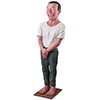EXHIBITED:
Yue Minjun and the Symbolic Smile, Queens Museum of Art, New York, 14 October, 2007 – 6 January, 2008
ILLUSTRATED:
Yue Minjun – The Lost Self, Hebei Education Press, Hebei, Shijiazhuang, 2005, color illustrated, pp. 200-209
Collected Edition of Chinese Oil Painters: Volume of Yue Minjun, Chengdu, Sichuan Fine Arts Publishing House, China, 2006, Chengdu, color illustrated, pp. 156-165
Contemporary Artists Collection – Yue Minjun, Sichuan Fine Arts Publishing House, Chengdu, China, 2007, color illustrated, pp. 64-65
Catalogue Note:
Over the past decade, Yue Minjun has enjoyed high levels of visibility for his melodramatic art forms within the contemporary Chinese art scene. He plays an important role in Cynical Realism, which is exemplified by his distinctive style of exaggeration and subversive humor. He has been producing paintings and sculptures using caricatures of his own image since the 1990s, an approach he is beginning to employ in the creation of his sculptures. Yue also borrows freely from the exaggerated, willfully distorted public sculptures of 60s and 70s China and integrates them into his artworks, transforming them into a sort of self image of the nation. An artist’s cultivation of his creative methods is usually a long, arduous process. To give his artworks more possibilities of introspection, Yue began to contemplate the questions of how to minutely observe people’s everyday lives and to express himself through experience and tolerance. He eventually found his answers in a true Oriental fashion – the concealment of true thoughts and feeling with falsity and normalization. Cynical realism, a movement that was thus engendered, is the thoughtful interrogation of the world through irony and humor, and Yue is no doubt one of the most well known cynical realists of today.
Laughter originates from pain, and pain is the essence of life, said Yue, an artist who laughingly observes life with his artistic creations. In his Contemporary Chinese Warriors collection, which he began working on in 2000, the artist engaged in a strong visual response to the 7000 terracotta warriors that were produced during the Qin dynasty (221 – 206 BC). Rediscovered in Shi’an in 1974, the terracotta army is one of China’s the most renowned tourist destinations. Yue tried to digest and regurgitate this historical energy by turning these signifiers of cultural tourism into a revelation of the public’s eagerness to identify in the warriors’ makers characteristics of individualism and cultural heroism. The creation of Contemporary Chinese Warriors, was also a form of stage performance, a way of magnifying the artist’s self image and formulating a modern hero. Yue multiplied these images and shaped himself into a new pluralized idol, an image representative of collectivity and national character.
The Contemporary Chinese Warriors collection is made of colored glass fiber. The artist arranges 25 identical human figurines into triangular bowling pin or circular configurations. These arrangements highlight the senselessness, humor and folly of today’s vacuous spiritual world. The life-like figurines laugh with toothy grins, tightly shut eyes, and a silly demeanor, yet appear to be thoughtfully confident, narcissistic and assured as they turn a blind eye on things they deem to be familiar and banal, perfectly exemplifying the personality cult of a post-absolutist culture. The artist uses humor to demonstrate the power of irony, which is perhaps the self of contemporary Chinese art as well as the most revealing form of his self-image. Yue once stated, When an image is duplicated continuously, the subsequent strength in numbers produces an immense force. Once the image transforms into an idol, I am able to manipulate and utilize the image repeatedly. An idol has the force of life; it often influences our everyday lives and regulates our conduct by imposing itself as an example. Contemporary society is an idolized society; hence its culture has become an idolized culture. (Diana Yeh, The Wisdom of Fools) Yue is using his unique language to criticize the many contradictions that contemporary China faces as it continues to move forward through the 21st century.


